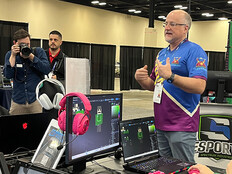Why Do Professional Certifications for Students Matter?
The student benefits that come with earning a professional certification are undeniable. Lowell Matthews, policy director of college and career pathways for nonprofit organization ExcelinEd, explains the following advantages in a blog post:
- Build up foundational skills: Completing a professional certification program allows students to “experience the real-world demands of work in a practical way,” Matthews writes. That’s because students often go through hands-on instruction and practice to prepare for their certification exams. All of the work leading up to those tests trains students in critical thinking, problem-solving and prioritizing information, Matthews says.
- Enhance student engagement: Matthews points to the success of high school students with certifications using data from the Florida Department of Education information system. Matthews, who previously served as the staff director for the Florida Legislature’s Senate Committees on Pre-K–12 and Higher Education, explained that students with certifications had higher GPAs, were more likely to graduate and less likely to be chronically absent compared with those without certifications.
- Lead to multiple career pathways: Professional certifications serve as stepping stones on a career map, Matthews writes. While they’re representative of skills students may need to succeed in a specific industry, they also give students a chance to evolve their career interests as programs branch off into pathways. Matthews gives the example of a CompTIA IT certification program that offers numerous pathways students can follow, such as information security, network and cloud technologies, and IT management and strategy.
Break into the Tech Field with Certifications
One of the fastest growing industries in the country is technology. Employment in computer and information technology is projected to grow 12 percent from 2018 to 2028, particularly in areas of cloud computing, Big Data management and information security, according to the U.S. Bureau of Labor Statistics.
Getting a technical certification can help students break into those fields before going to college, or perhaps without needing to. Here are a few certification programs that can give students that boost:
- Google for Education’s G Suite Certification: This professional certification program tests students ages 13 and up on G Suite applications, such as Google Drive, Docs and Sheets, which have become essential in today’s increasingly digital workplace. Students can prep for the two-hour exam using Applied Digital Skills, a free online curriculum on skills such as analyzing data on Sheets and creating a presentation in Slides. Google also offers self-paced practice labs that go through the exam’s structure and sample questions that might be on the exam.
- Microsoft Certifications: Microsoft offers numerous certifications for students that can also count toward college credits. The certification exams are organized by technical job roles, products, levels and certification types, making it easy for students to find out which skills they need for a specific career path. To prepare, students can sign up for an in-person training session and take free online courses on Microsoft Learn.
- Acer Repair Certification: Two years ago, Acer launched an e-learning program for students to get certified in performing basic hardware repairs on devices such as Acer Chromebooks. Through modules and games, students learn about Chromebook component functions, replacement and reconfiguration, which are key in completing their final assessment: replacing a Chromebook’s mainboard or LCD screen.
- Adobe Certified Associate: Students can show their proficiency in eight Adobe Creative Cloud products such as InDesign, Premiere Pro with this industry-recognized certification. The program also has three pathways students can take based on their interests and aspirations: visual design, video design and web design. Adobe also provides free study guides and ACA-related materials for purchase. The best part: Adobe also has resources to help students kick-start their creative career, such as an ACA Facebook networking group and a set of video tutorials to help students create their professional brand.
- CompTIA IT Certifications: These certifications are industry-leading credentials that can help high school students jumpstart their IT career. They range from entry-level knowledge in computer hardware and software to advanced skills in cloud computing and cybersecurity. Students can also use the CompTIA Career Pathway and CompTIA Career Roadmap to figure out which certification is best for them. There are even school districts such as the Bartow County School System in Cartersville, Ga. that offer distance learning opportunities to help students earn technology certifications, such as CompTIA A+, Network+ and Security+, by the time they graduate.
Overall, these types of certifications not only encourage students to advance important digital skills, but also equip them to become future leaders in an increasingly tech-driven world.
This article is part of the “ConnectIT: Bridging the Gap Between Education and Technology” series. Please join the discussion on Twitter by using the #ConnectIT hashtag.







![[title]Connect IT: Bridging the Gap Between Education and Technology [title]Connect IT: Bridging the Gap Between Education and Technology](http://www.edtechmagazine.com/k12/sites/default/files/articles/2014/05/connectit.jpg)




